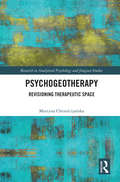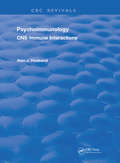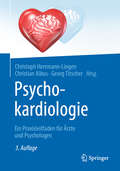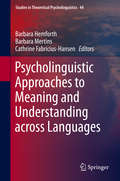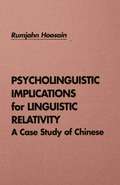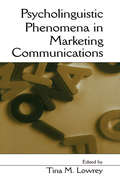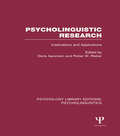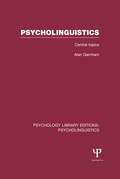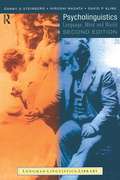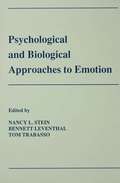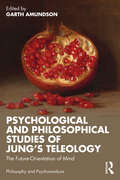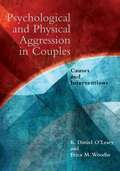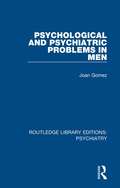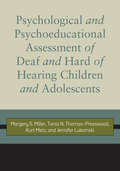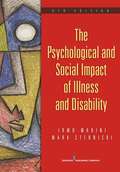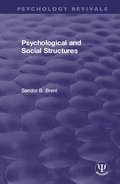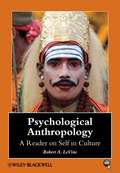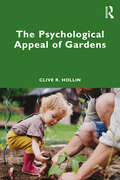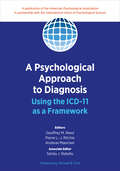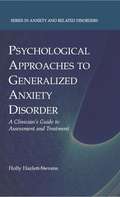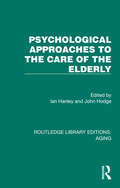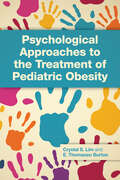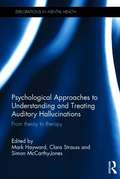- Table View
- List View
Psychogeotherapy: Revisioning Therapeutic Space (Research in Analytical Psychology and Jungian Studies)
by Martyna ChrześcijańskaPsychogeotherapy offers a critical exploration of the roles played by ideas of space and containment in psychotherapy. Employing approaches from psychogeography with a focus on the praxis of ‘aimless walking’, it explores alternate models of therapeutic space and what the author terms ‘psychogeotherapy’. The book gives a fresh and creative perspective on therapeutic work and its relationship to space, drawing on a range of existing approaches including Freudian, post-Freudian, Jungian and post-Jungian perspectives. With perspectives from various disciplines such as art, social studies, cultural studies and philosophy, the book interrogates the dominant models of containment in psychotherapy and discusses these models from different perspectives to shed new light on classical concepts of therapeutic space and containment in depth psychology and psychotherapy. This book will be of great interest for academics, researchers and post-graduate students in the fields of analytical psychology, psychotherapy, psychogeography and mental health.
Psychoimmunology: CNS Immune Interactions (Routledge Revivals)
by Alan J. HusbandFirst published in 1993, Psychoimmunology: CNS-Immune Interactions is based on papers presented at the Second International Scientific Meeting of the Australian Behavioral Immunology Group, held at the University of Newcastle in Australia on March 7 and 8, 1992. Information featured in the volume confirms the longstanding perception that state of mind and behavioral patterns have an impact on general health. Clinicians discuss correlations between lifestyle, stress, and disease, while scientists reveal their findings on ways in which deliberate manipulations of the central nervous systems and behavioral patterns are reflected in changes in immunological outcome. Other papers present findings regarding the mediators of these interactions, which include cytokines, hormones, and neurotransmitters. Psychoimmunology: CNS-Immune Interactions will be a useful reference for psychoimmunologists, immunologists, psychologists, microbiologists, and all medical and behavioral scientists interested in the links between brain behavior and disease.
Psychokardiologie: Ein Praxisleitfaden für Ärzte und Psychologen
by Christoph Herrmann-Lingen Christian Albus Georg TitscherDie psychosomatische Diagnostik und Therapie hat eine zunehmend wichtige Bedeutung bei der Akutbehandlung, Prävention und Rehabilitation kardiovaskulärer Erkrankungen.Der Zusammenhang zwischen Herzerkrankungen und Psyche sowie den psychosozialen Begleiterscheinungen ist gut belegt. Grundlagen der Kardiologie und psychosomatischen MedizinArzt-Patienten-BeziehungEthische Fragestellungen, Gendereffekte, Psychokardiologie entlang der LebensspannePsychosomatische Problemfelder und KomorbiditätenUrsachen und Folgen: Persönlichkeitsfaktoren, Risikoverhalten, Depression, Angststörungen …Spezifische Diagnostik und Behandlungskonzepte – ambulant und stationärInterdisziplinäre Zusammenarbeit NEU u.a. Collaborative careAkut-Kardiologie, Heart Failure UnitsRehabilitation Entsprechend den deutschen und europäischen Empfehlungen und Leitlinien u.a. DGK Positionspapier zur Bedeutung psychosozialer Faktoren in der KardiologieNationale VersorgungsLeitlinie Chronische KHKESC CVD Prevention in Clinical Practice Geeignet für die Kurse nach den Curricula „Psychokardiologische Grundversorgung“ (D) und „Kardiologische Psychosomatik“ (AU). Zur Vertiefung der entsprechenden Inhalte der Kurse „Psychosomatische Grundversorgung“.Das Buch bietet Kardiologen, Internisten, Allgemeinmedizinern, Psychotherapeuten und Psychologen alle praxisrelevanten Grundlagen, um ihre Patienten bestmöglich behandeln zu können.
Psycholinguistic Approaches to Meaning and Understanding across Languages
by Barbara Hemforth Barbara Mertins Cathrine Fabricius-HansenReports on joint work by researchers from different theoretical and linguistic backgrounds offer new insights on the interaction of linguistic code and context in language production and comprehension. This volume takes a genuinely cross-linguistic approach integrating theoretically well-founded contrastive descriptions with thorough empirical investigations. Authors answer questions on the topic of how we 'encode' complex thoughts into linguistic signals and how we interpret such signals in appropriate ways Chapters combine on- and off-line empirical methods varying from large-scale corpus analyses over acceptability judgements, sentence completion studies and reading time experiments. The authors shed new light on the central questions related to our everyday use of language, especially the problem of how we construe meaning in and through language in general as well as through the means provided by particular languages.
Psycholinguistic Implications for Linguistic Relativity: A Case Study of Chinese
by Rumjahn HoosainRather than offering variations in "world view" as evidence for linguistic relativity, this book views language related differences in terms of the facility with which information is processed. Distinctive perceptual, memory, and neurolinguistic aspects of the Chinese language are discussed, as is the cognitive style of the Chinese people. Chinese orthography and other features of morphology and syntax are examined in relation to both bottom-up and top-down cognitive processes. While providing an extensive review of the experimental literature published in English on the Chinese language, this volume also offers a significant sample of the literature originally published in Chinese.
Psycholinguistic Phenomena in Marketing Communications
by Tina M. LowreyThe field of psycholinguistics and the application of psycholinguistic theory to advertising and marketing communication has become a topic of great prominence in the field of consumer behavior. Psycholinguistic Phenomena in Marketing Communications is the first book to address the growing research in this area. This timely volume combines research conducted by current scholars as it demonstrates diversity of the field in terms of relevant topics and methodological approaches. It examines brand names and their semantic and sound-based impact; sentence structure and research in marketing communication; advertising narratives evoking emotional responses; the effects of empathy response on advertising; and the role of language and images in creation of advertising. The book includes authors from a variety of fields, including mass communication, marketing, social psychology, linguistics, and neuropsychology. A range of perspectives is discussed, from qualitative text analysis to controlled psychological experimentation. Psycholinguistic Phenomena in Marketing Communications is intended for students and scholars in numerous disciplines, such as advertising, marketing, social psychology, sociology, and linguistics. It is also suitable for graduate courses in these disciplines.
Psycholinguistic Research: Implications and Applications (Psychology Library Editions: Psycholinguistics)
by Doris Aaronson Robert W. RieberOriginally published in 1979, this book represents an effort to bring together the two disciplines at the core of psycholinguistics, psychology and linguistics. It discusses a broad variety of theoretical approaches to psycholinguistics as well as covering a wide range of topics. At the time the book had four goals: to discuss many of the important contemporary issues in psycholinguistics; to explore the different views on major theoretical controversies; to provide an analysis of background literature as a framework in which to evaluate the issues and controversies; and to describe interesting high-quality research currently being done by the authors and some of their colleagues. Today it can be read and enjoyed in its historical context, with many of the chapters still relevant in psycholinguistic research today.
Psycholinguistics: Central Topics
by Alan GarnhamFrom the author: This book reflects my beliefs about how psycholinguistics, and cognitive psychology in general, should be taught. Since psycholinguistics is a scientific discipline, the book discusses theories about the central cognitive aspects of language understanding, rather than presenting a morass of unstructured facts on a series of loosely connected topics. It also attempts to reflect the emergence of cognitive science, an interdisciplinary approach to the study of language and other cognitive processes. It describes not only psychological studies, but also ideas from linguistics, artificial intelligence, the philosophy of language and formal logic. There is no pretence that the discussion is exhaustive.
Psycholinguistics: Central Topics (Psychology Library Editions: Psycholinguistics)
by Alan GarnhamOriginally published in 1985, this title was an important new teaching text at the time. Alan Garnham focuses on current theories about the central cognitive aspects of language understanding, and attempts to reflect the emergence of cognitive science, an inter-disciplinary approach to the study of language and other cognitive processes. As well as describing psychological studies, the text includes ideas from linguistics, artificial intelligence, the philosophy of language and formal logic. Some introductory remarks on the study of language understanding precede a discussion of word recognition and the computation of the syntactic structure of sentences. The central part of the book is concerned with questions about meaning, the mental representation of word meanings, and text comprehension. The final two chapters address questions of how the parts of the language processing system operate together, and how language production is related to comprehension. Rather than attempting an exhaustive discussion of empirical research on his chosen topics, the author gives the reader the flavour of linguistic arguments. In particular, Psycholinguistics attempts to indicate the problems and also the possibilities of relating experimental data to theories of language processing. Psycholinguistics will still be useful reading on courses in psycholinguistics, language and thought, and cognitive psychology.
Psycholinguistics: Language, Mind and World (Longman Linguistics Library)
by Danny D. Steinberg Hiroshi Nagata David P. AlineHow do we learn to produce and comprehend speech? How does language relate to thought?This second edition of the successful text Psycholinguistics- Language, Mind and World considers the psychology of language as it relates to learning, mind and brain as well as various aspects of society and culture. Current issues and research topics are presented in an in-depth manner, although little or no specific knowledge of any topic is presupposed.The book is divided into four main parts: First Language Learning Second Language Learning Language, Mind and Brain Mental Grammar and Language Processing These four sections include chapters covering areas such as- deaf language education, first language acquisition and first language reading, second language acquisition, language teaching and the problems of bilingualism.Updated throughout, this new edition also considers and proposes new theories in psycholinguistics and linguistics, and introduces a new theory of grammar, Natural Grammar, which is the only current grammar that is based on the primacy of the psycholinguistic process of speech comprehension, derives speech production from that process. Written in an accessible and fluent style, Psycholinguistics- Language, Mind and World will be of interest to students, lecturers and researchers from linguistics, psychology, philosophy and second language teaching.
Psychological and Biological Approaches To Emotion
by Nancy L. Stein Tom Trabasso Bennett LeventhalThe outgrowth of a University of Chicago conference on the psychological and biological bases of behavior, this unique collection of papers integrates the biological consideration of emotion with current psychological approaches. As such, it includes studies of the coping process associated with emotion as well as those that focus on the appraisal process giving rise to emotion. The book approaches emotion from cognitive, developmental, and biological systems and psychopathological perspectives. Theories on the cognitive, biological, and developmental bases for interpreting, representing, and reacting to emotional situations are proposed. In addition, new studies on issues and questions regarding the roles of cognition, language, brain lateralization, socialization, psychopathology, and coping with affect are presented.
Psychological and Philosophical Studies of Jung’s Teleology: The Future-Orientation of Mind (ISSN)
by Garth AmundsonThis important new volume addresses an underappreciated dimension of Jung’s work, his concept of the teleology, or “future-orientation”, of psychic reality.The work, authored by an international group of Jungian scholars, expands upon the socio-cultural, psychological, therapeutic, and philosophical import of this key pillar of the Jungian oeuvre, offering a compelling alternative to current, culturally dominant ideas about how change occurs. The book addresses varied aspects of his teleological thought generally, and its application to the psychotherapeutic endeavor specifically, engaging Freudian, neo-Freudian, and related theoretical orientations in an informed dialogue about the critical issue of the emergent unfolding of subjectivity in treatment.This is an illuminating read for those interested in the study of Jungian theory, psychoanalysis, social psychology, religion, transpersonal psychology, indigenous wisdom traditions, and philosophical metapsychology.
Psychological and Physical Aggression in Couples: Causes and Interventions
by K. Daniel O'Leary Erica M. WoodinAn investigation into the interplay of psychological and physical aggression between partners, this book examines the history of research in this area, discusses cutting-edge studies, and suggests promising applications in clinical settings.
Psychological and Political Strategies for Peace Negotiation
by Mauro Galluccio Francesco AquilarPeace is one of the most sought after commodities around the world, and as a result, individuals and countries employ a variety of tactics to obtain it. One of the most common practices used to accomplish peace is negotiation. With its elevated role in the dialogue surrounding peace, negotiation is often steeped in politics and focused on managing parties in conflict. However, the art and science of negotiation can and should be viewed more broadly to include a psychological and cognitive approach. Psychological and Political Strategies for Peace Negotiation gathers the foremost authors in the field and combines their expertise into a volume which addresses the complexity of peace negotiation strategies. To further underscore the importance of successful negotiation strategies, the editors have also included the unique perspective of authors with personal experience with political upheaval in Serbia and Lebanon. Though each chapter focuses on a different topic, they are integrated to create a foundation for future research and practice. Specific topics included in this volume embrace: * Changing minds and the multiple intelligence (MI) framework * Personal schemas in the negotiation process * Escalation of image in international conflicts * Representative decision making * Transformative leadership for peace negotiation Psychological and Political Strategies for Peace Negotiation is an essential reference for psychologists, negotiators, mediators, and conflict managers, as well as for students and researchers in international, cross-cultural and peace psychology studies.
Psychological and Psychiatric Problems in Men (Routledge Library Editions: Psychiatry #10)
by Joan GomezWhat causes a man to become depressed or even psychotic? This book, originally published in 1991, provides an account of a grossly neglected subject: the social, sexual, psychological and psychiatric problems facing men. Dealing with issues such as aggression, violence, criminality, sexuality, and alcohol and drug dependence, it will be essential reading for health professionals, social workers and welfare officers, as well as those interested in gender studies.
Psychological and Psychoeducational Assessment of Deaf and Hard of Hearing Children and Adolescents
by Margery S. Miller Jennifer Lukomski Tania N. Thomas-Presswood Kurt MetzThe obstacles to valid and meaningful assessment of deaf and hard of hearing children and adolescents are great, yet professionals are regularly asked to conduct comprehensive evaluations to determine resource and program eligibility, test modifications in school, classroom and home recommendations, and referrals. In this important new text, the authors define the skills required of the examiners, explain the complex nature of these assessments, and describe ways to intelligently use existing tests. Authors Margery S. Miller, Tania Thomas-Presswood, Kurt Metz, and Jennifer Lukomski bring a wealth of knowledge and experience to this in-depth treatment of topics essential to educators and school psychologists. They cover such critical areas as test construction and measurement; the diversity in American Deaf culture; the role of parents in the assessment process; neuropsychological assessments; nonverbal methods for assessing intelligence; and the need for sign language competency when testing cognitive and language skills. The text concludes with recommendations for the development of valid and reliable tests for all students who are deaf and hard of hearing.
The Psychological and Social Impact of Illness and Disability (Sixth Edition)
by Irmo Marini Mark StebnickiExamines current thought and treatment approaches in working with individuals with disabilities. Abundant and insightful narratives by disabled individuals offer a bridge between theory and practice for students in rehabilitation psychology and counselling courses.
Psychological and Social Structures (Psychology Revivals)
by Sandor B. BrentOriginally published in 1984, this work is organised in three parts. Each part consists of several related chapters. Each chapter explores the assumptions and implications of a closely related group of concepts in depth. Part 1 explores what a structure is. It considers such notions as content, context, constraint, unity, integrity, and the hierarchical and nucleate forms of organization. Part 2 critically explores the dynamic (energic) conceptualization of psychological and social phenomena. Thus, this part considers such notions as energy, entropy, activity, confirmation, discrepancy, and resistance, as they apply to and affect the stability, activity, and changes observed in psychological and social structures. The relationship among the biological (metabolic), psychological, and social levels of analysis are explored from a rather simplified thermodynamic point of view. In Part 3 brings all these earlier considerations to bear upon the processes by which these structures grow and develop. It explores the concept of development itself, and such related issues as the levels-by-stages model of development, the distinction between intrastructural and intergenerational development, the orthogenic principles, the process of primordial differentiation and integration, development as a dialectical process, and the relationship between growth and development. The Epilogue indicates briefly some of the implications of the present thesis for future empirical and theoretical investigations.
Psychological Anthropology: A Reader on Self in Culture
by Robert A. LevineDrawing from some of the most significant scholarly work of the 19th and 20th centuries, the Blackwell Anthologies in Social and Cultural Anthropology series offers a comprehensive and unique perspective on the ever-changing field of anthropology. It represents both a collection of classic readers and an exciting challenge to the norms that have shaped this discipline over the past century.
The Psychological Appeal of Gardens
by Clive R. HollinThis insightful book explores the relationship we have with gardens and with the act of gardening, considering in detail the psychological, social and health benefits. From the Garden of Eden and the Hanging Gardens of Babylon to Kew Gardens and the humble suburban plot, it is self-evident that gardens and gardening have an ever-present attraction. This book addresses the appeal of gardens from a psychological perspective: Why do we spend our cash on plants and gardening paraphernalia and give hours of our time to tending our annuals, bulbs and shrubs? Why do we travel to see gardens in our own and other countries? The theme of this book lies in identifying the individual and social rewards to be found in gardens and gardening, particularly within our own private gardens. The Psychological Appeal of Gardens will be of great interest to students and scholars of applied psychology, as well those taking horticultural courses of various levels, from professional horticulturalists to enthusiastic amateurs.
A Psychological Approach to Diagnosis: Using the ICD-11 as a Framework
by Geoffrey M. Reed Pierre L.-J. Ritchie Andreas Maercker Tahilia J. RebelloThis groundbreaking volume, published by the American Psychological Association in partnership with the International Union of Psychological Science, provides a detailed guide to clinical diagnosis by psychologists and other health professionals based on the eleventh revision of the World Health Organization's International Classification of Diseases (ICD-11). The ICD-11 was adopted by the World Health Assembly in 2019 and came into effect as the global standard for health information and reporting in 2022. The ICD is the diagnostic system for mental disorders most widely used by mental health professionals around the world in their day-to-day clinical practice. This edited volume offers a step-by-step approach to diagnosis, giving mental health professionals around the world the tools they need to apply ICD-11 diagnostic requirements for mental, behavioral, and neurodevelopmental disorders as the basis for delivering high quality, evidence-informed care. A psychological approach to diagnosis is a conceptually driven, person-oriented, biopsychosociocultural formulation that integrates pertinent history, behavior, symptoms, phenomenology, and functioning. A psychological approach focuses on psychological mechanisms and principles as an aspect of diagnostic practice and case formulation, regardless of professional discipline. The chapters of this book cover the major groupings of mental disorder as well as related areas that are important parts of psychological practice, such as sexual dysfunctions, sleep-wake disorders, and relationship problems and maltreatment. The authors of this book are leading global experts in each area, many of whom were integrally involved in developing the respective sections of the ICD-11. Authors describe the overarching logic for the classificatory arrangement and the elements of a psychological approach to the set of disorders discussed in each chapter, including psychological models for conceptualizing their symptoms and recommendations for psychological assessment. The chapters also discuss presentations and symptom patterns for each major group of disorders, specifiers and subtypes, the threshold between normal variation and disorder, differential diagnoses, co-occurring disorders, developmental course, cultural and contextual considerations, and gender-related features. A Psychological Approach to Diagnosis is the first comprehensive training resource on WHO&’s ICD-11 classification of mental, behavioural and neurodevelopmental disorders. It provides practicing psychologists and other mental health professionals, primary care clinicians, educators, and trainees with essential tools for the competent practice of diagnosis using the ICD-11 as a framework.
Psychological Approaches to Generalized Anxiety Disorder
by Holly Hazlett-StevensConcise, yet without skimping on information, this book reviews current theory and research, addresses important diagnostic issues, and provides salient details in a number of key areas related to GAD. Assessment procedures and treatment planning are covered, along with the latest therapy outcome data, including findings on newer therapies. Also detailed are specific cognitive behavioral therapy techniques, including cognitive strategies, psychoeducation, and anxiety monitoring.
Psychological Approaches to the Care of the Elderly (Routledge Library Editions: Aging)
by Ian Hanley John HodgeOriginally published in 1984, the overall purpose of this book was to provide ideas and suggestions about the usefulness of applied psychology in dealing with some of the problems of the elderly.
Psychological Approaches to the Treatment of Pediatric Obesity
by Dr. Crystal Stack Lim Dr. Elvin Thomaseo BurtonThis book offers a comprehensive review of current research and theoretical approaches to pediatric obesity. Pediatric obesity is a significant public health concern that currently affects 1 in 5 children and adolescents. Prevention and treatment of this complex health condition requires a multifaceted approach that acknowledges the intersecting roles of gender, race and ethnicity, socioeconomic status, and other factors that play key roles in the onset and maintenance of pediatric obesity. Written for mental health clinicians, as well as medical practitioners such as physicians, nurses, dietitians, and exercise physiologists who care for children and adolescents, this helpful resource offers a comprehensive review of current research and theoretical approaches, as well as clear descriptions of effective strategies to prevent and treat pediatric obesity. Through a lens of diversity, equity, and inclusion, the authors incorporate cutting edge research and their extensive clinical experience and expertise as they review evidence-based treatments that can be incorporated into various settings, including primary care, mental health, and specialty medical care clinics as well as schools and community organizations. With a special focus on psychological factors, including mental health conditions that frequently co-occur with pediatric obesity, this book incorporates case examples, treatment guidelines, and reproducible handouts to make addressing pediatric obesity more accessible to clinicians and practitioners.
Psychological Approaches To Understanding And Treating Auditory Hallucinations: From Theory To Therapy
by Mark Hayward Clara Strauss Simon Mccarthy-JonesThis book draws on clinical research findings from the last three decades to offer a review of current psychological theories and therapeutic approaches to understanding and treating auditory hallucinations, addressing key methodological issues that need to be considered in evaluating interventions. Mark Hayward, Clara Strauss and Simon McCarthy-Jones present a historical narrative on lessons learnt, the evolution of evidence bases, and an agenda for the future. The text also provides a critique of varying therapeutic techniques, enabling practice and treatment decisions to be grounded in a balanced view of differing approaches. Chapters cover topics including: behavioural and coping approaches cognitive models of voice hearing the role of self-esteem and identity acceptance-based and mindfulness approaches interpersonal theory. Psychological Approaches to Understanding and Treating Auditory Hallucinations brings together and evaluates diffuse literature in an accessible and objective manner, making it a valuable resource for clinical researchers and postgraduate students. It will also be of significant interest to academic and clinical psychologists working within the field of psychotic experiences.
